Unit 4 My Favourite Subject Section A Vocabulary&Sentences 课件鲁教版(五四制)(2024) 六年级上册
文档属性
| 名称 | Unit 4 My Favourite Subject Section A Vocabulary&Sentences 课件鲁教版(五四制)(2024) 六年级上册 | 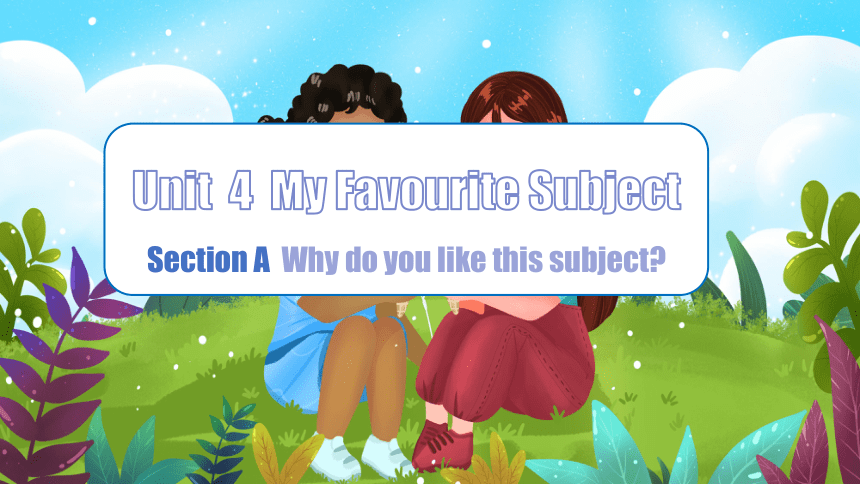 | |
| 格式 | pptx | ||
| 文件大小 | 20.3MB | ||
| 资源类型 | 试卷 | ||
| 版本资源 | 鲁教版 | ||
| 科目 | 英语 | ||
| 更新时间 | 2024-08-25 13:01:15 | ||
图片预览

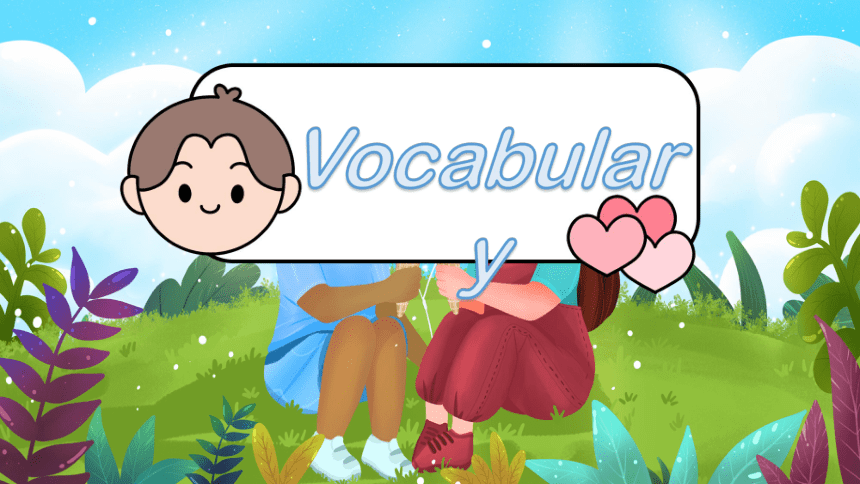
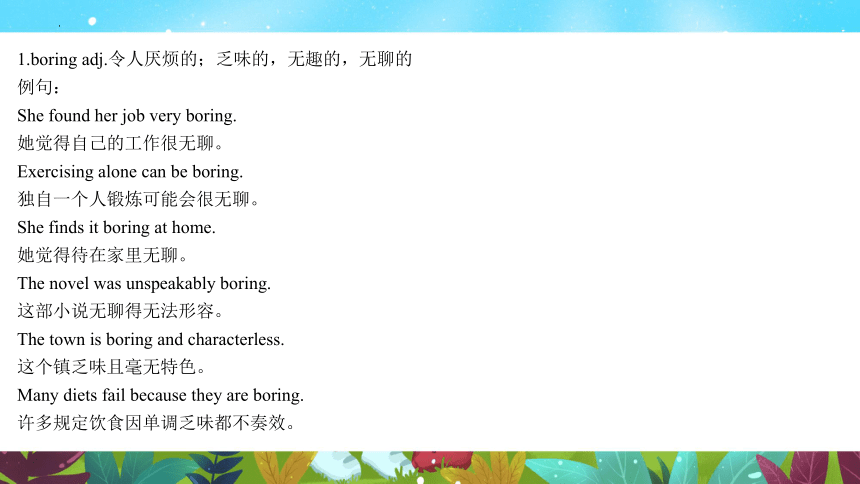
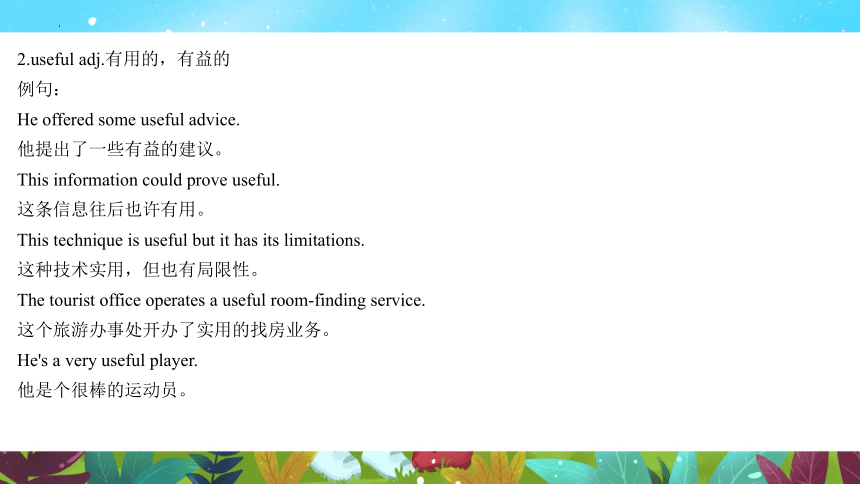
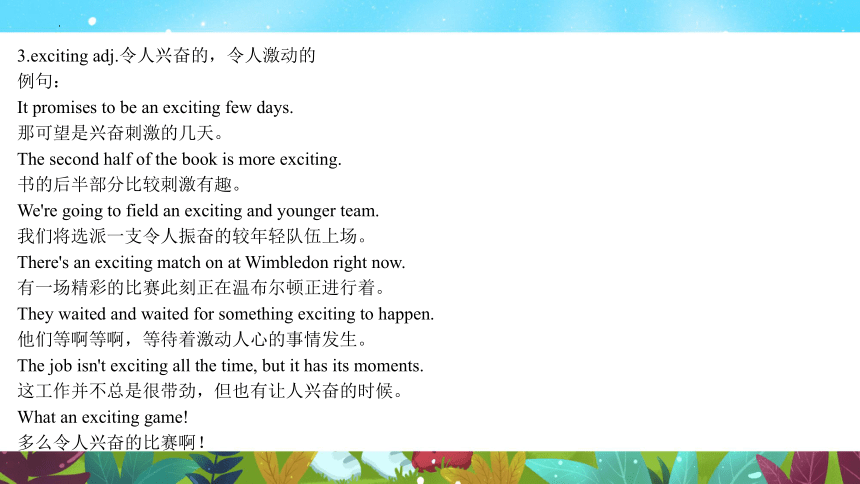
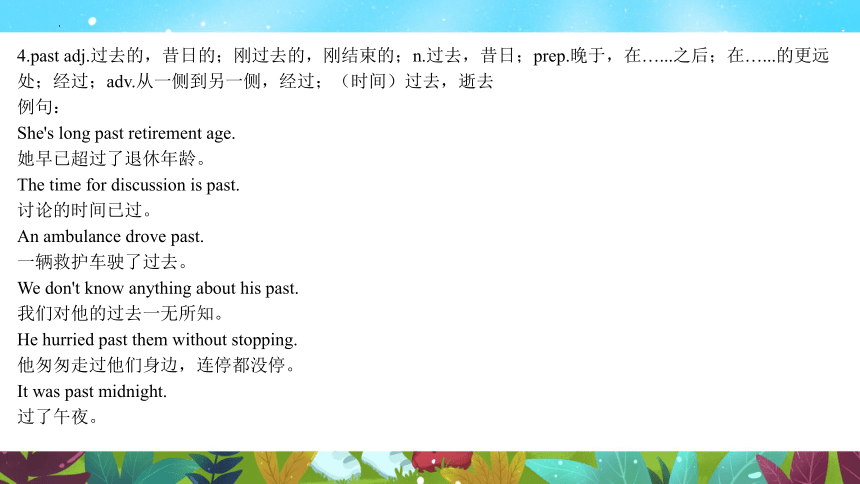
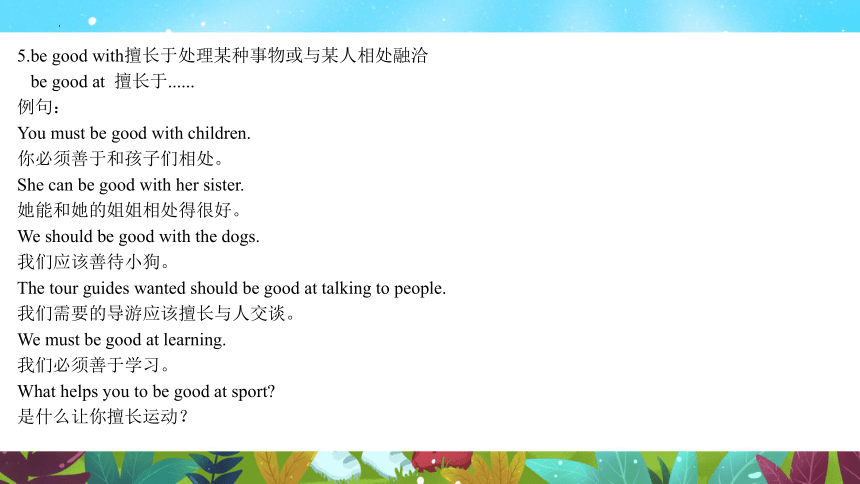
文档简介
(共17张PPT)
Unit 4 My Favourite Subject
Section A Why do you like this subject
Vocabulary
1.boring adj.令人厌烦的;乏味的,无趣的,无聊的
例句:
She found her job very boring.
她觉得自己的工作很无聊。
Exercising alone can be boring.
独自一个人锻炼可能会很无聊。
She finds it boring at home.
她觉得待在家里无聊。
The novel was unspeakably boring.
这部小说无聊得无法形容。
The town is boring and characterless.
这个镇乏味且毫无特色。
Many diets fail because they are boring.
许多规定饮食因单调乏味都不奏效。
2.useful adj.有用的,有益的
例句:
He offered some useful advice.
他提出了一些有益的建议。
This information could prove useful.
这条信息往后也许有用。
This technique is useful but it has its limitations.
这种技术实用,但也有局限性。
The tourist office operates a useful room-finding service.
这个旅游办事处开办了实用的找房业务。
He's a very useful player.
他是个很棒的运动员。
3.exciting adj.令人兴奋的,令人激动的
例句:
It promises to be an exciting few days.
那可望是兴奋刺激的几天。
The second half of the book is more exciting.
书的后半部分比较刺激有趣。
We're going to field an exciting and younger team.
我们将选派一支令人振奋的较年轻队伍上场。
There's an exciting match on at Wimbledon right now.
有一场精彩的比赛此刻正在温布尔顿正进行着。
They waited and waited for something exciting to happen.
他们等啊等啊,等待着激动人心的事情发生。
The job isn't exciting all the time, but it has its moments.
这工作并不总是很带劲,但也有让人兴奋的时候。
What an exciting game!
多么令人兴奋的比赛啊!
4.past adj.过去的,昔日的;刚过去的,刚结束的;n.过去,昔日;prep.晚于,在…...之后;在…...的更远处;经过;adv.从一侧到另一侧,经过;(时间)过去,逝去
例句:
She's long past retirement age.
她早已超过了退休年龄。
The time for discussion is past.
讨论的时间已过。
An ambulance drove past.
一辆救护车驶了过去。
We don't know anything about his past.
我们对他的过去一无所知。
He hurried past them without stopping.
他匆匆走过他们身边,连停都没停。
It was past midnight.
过了午夜。
5.be good with擅长于处理某种事物或与某人相处融洽
be good at 擅长于......
例句:
You must be good with children.
你必须善于和孩子们相处。
She can be good with her sister.
她能和她的姐姐相处得很好。
We should be good with the dogs.
我们应该善待小狗。
The tour guides wanted should be good at talking to people.
我们需要的导游应该擅长与人交谈。
We must be good at learning.
我们必须善于学习。
What helps you to be good at sport
是什么让你擅长运动?
6.reason n.原因,理由
例句:
I had no reason to doubt him.
我没有理由不相信他。
I have good reason to be suspicious.
我的怀疑有充分理由。
There is no reason to disbelieve him.
没理由不相信他。
Are you angry with me for some reason
你是因为某个原因生我的气了吗?
This was the real reason for her call.
这是她打电话的真实原因。
7.listen to倾听
例句:
Why couldn't he listen to her
为什么他不能听她的话?
I listen to music for relaxation.
我听音乐放松心情。
I listen to the radio on the way to work.
我在上班的路上听广播。
You could at least listen to what he says.
你至少可以听一听他说些什么。
8.remember v.回想起,记得;记起,忆起(某事物);记牢,不忘记;纪念,缅怀
例句:
I don't remember the exact words.
我不记得确切的话了。
Don't tell me you can't remember.
别告诉我你不记得了。
I can't remember her exact words.
我记不清她的原话了。
I'll certainly remember this trip!
我绝不会忘记这次旅行!
I will remember it to my dying day.
我至死都不会忘记此事。
I'm afraid I can't remember the way.
恐怕我不记得路了。
I can't remember which teachers I had.
我不记得哪些老师教过我。
Sentences
1.I like all the subjects, but my favourite is maths. 我喜欢所有的科目,但我最喜欢的是数学。
【要点释义】并列连but表示转折或对比,连接两个并列成分,表示前后意义上的转折或对比,意为“但是”、“然而”。
例句:
He is old, but he looks very young.
他老了,但他看起来很年轻。
I love playing basketball, but I also enjoy swimming.
我喜欢打篮球,但我也喜欢游泳。
She is American but she lives in England.
她是美国人,但住在英国。
The weather was sunny, but it soon turned cloudy.
天气晴朗,但很快变得多云。
He is intelligent but often forgetful.
他很聪明,但经常健忘。
I can believe him, but I cannot believe in him.
我相信他说的话是真的,但是不相信他的为人。
2.Can you help me with this subject 你能帮我解决这个问题吗?
【要点释义】“help...with...”是一个常用的英语句式,意为“帮助(某人)做(某事)”。具体来说,“help”作为动词,表示提供帮助或协助的行为,“with”作为介词, 后面跟上需要被帮助的具体事项或对象。 这个句式可以用于描述各种提供帮助的场景,如帮助某人完成某项任务、帮助某人解决某个问题或帮助某人学习某个技能等。
例如:
He helps his friends with their art.他帮助他的朋友们的艺术创作。
在这个句子中,“helps”是动词,“friends”是被帮助的对象,“with their art”是具体被帮助的事项。
Exercises
补全对话
从文后选取适当的选项完成对话(有多余项)。
A: 1
B: I usually get up at 6 o’clock.
A: What time do you have breakfast
B: I have breakfast at 6:30 a. m.
A: 2
B: School starts at 8:00 a. m.
A: 3
B: My favourite subject is maths.
A: 4
B: Because it’s interesting.
A: Who is your maths teacher
B: 5
A.What time does school start
B.My maths teacher is Mr Smith.
C.What’s your favourite subject
D.How do you get to school
E.Why do you like maths
F.When do you usually get up
【答案】1.F 2.A 3.C 4.E 5.B
【解析】本文是A、B之间的对话。A询问了B的一些日常时间安排、最喜欢的科目以及数学老师。
1.根据下文“I usually get up at 6 o’clock.”可知,空格处应询问对方通常几点起床。选项F“你通常几点起床?”符合语境,故选F。
2.根据下文“School starts at 8:00 a. m.”可知,空格处应询问对方几点开始上课。选项A“学校几点开始上课?”符合语境,故选A。
3.根据下文“My favourite subject is maths.”可知,空格处应询问对方最喜欢的科目是什么。选项C“你最喜欢的科目是什么?”符合语境,故选C。
4.根据上文“My favourite subject is maths.”和下文“Because it’s interesting.”可知,空格处应询问对方为什么喜欢数学。选项E“你为什么喜欢数学?”符合语境,故选E。
5.根据上文“Who is your maths teacher ”可知,空格处应说明数学老师是谁。选项B“我的数学老师是史密斯先生。”符合语境,故选B。
Thanks!
Unit 4 My Favourite Subject
Section A Why do you like this subject
Vocabulary
1.boring adj.令人厌烦的;乏味的,无趣的,无聊的
例句:
She found her job very boring.
她觉得自己的工作很无聊。
Exercising alone can be boring.
独自一个人锻炼可能会很无聊。
She finds it boring at home.
她觉得待在家里无聊。
The novel was unspeakably boring.
这部小说无聊得无法形容。
The town is boring and characterless.
这个镇乏味且毫无特色。
Many diets fail because they are boring.
许多规定饮食因单调乏味都不奏效。
2.useful adj.有用的,有益的
例句:
He offered some useful advice.
他提出了一些有益的建议。
This information could prove useful.
这条信息往后也许有用。
This technique is useful but it has its limitations.
这种技术实用,但也有局限性。
The tourist office operates a useful room-finding service.
这个旅游办事处开办了实用的找房业务。
He's a very useful player.
他是个很棒的运动员。
3.exciting adj.令人兴奋的,令人激动的
例句:
It promises to be an exciting few days.
那可望是兴奋刺激的几天。
The second half of the book is more exciting.
书的后半部分比较刺激有趣。
We're going to field an exciting and younger team.
我们将选派一支令人振奋的较年轻队伍上场。
There's an exciting match on at Wimbledon right now.
有一场精彩的比赛此刻正在温布尔顿正进行着。
They waited and waited for something exciting to happen.
他们等啊等啊,等待着激动人心的事情发生。
The job isn't exciting all the time, but it has its moments.
这工作并不总是很带劲,但也有让人兴奋的时候。
What an exciting game!
多么令人兴奋的比赛啊!
4.past adj.过去的,昔日的;刚过去的,刚结束的;n.过去,昔日;prep.晚于,在…...之后;在…...的更远处;经过;adv.从一侧到另一侧,经过;(时间)过去,逝去
例句:
She's long past retirement age.
她早已超过了退休年龄。
The time for discussion is past.
讨论的时间已过。
An ambulance drove past.
一辆救护车驶了过去。
We don't know anything about his past.
我们对他的过去一无所知。
He hurried past them without stopping.
他匆匆走过他们身边,连停都没停。
It was past midnight.
过了午夜。
5.be good with擅长于处理某种事物或与某人相处融洽
be good at 擅长于......
例句:
You must be good with children.
你必须善于和孩子们相处。
She can be good with her sister.
她能和她的姐姐相处得很好。
We should be good with the dogs.
我们应该善待小狗。
The tour guides wanted should be good at talking to people.
我们需要的导游应该擅长与人交谈。
We must be good at learning.
我们必须善于学习。
What helps you to be good at sport
是什么让你擅长运动?
6.reason n.原因,理由
例句:
I had no reason to doubt him.
我没有理由不相信他。
I have good reason to be suspicious.
我的怀疑有充分理由。
There is no reason to disbelieve him.
没理由不相信他。
Are you angry with me for some reason
你是因为某个原因生我的气了吗?
This was the real reason for her call.
这是她打电话的真实原因。
7.listen to倾听
例句:
Why couldn't he listen to her
为什么他不能听她的话?
I listen to music for relaxation.
我听音乐放松心情。
I listen to the radio on the way to work.
我在上班的路上听广播。
You could at least listen to what he says.
你至少可以听一听他说些什么。
8.remember v.回想起,记得;记起,忆起(某事物);记牢,不忘记;纪念,缅怀
例句:
I don't remember the exact words.
我不记得确切的话了。
Don't tell me you can't remember.
别告诉我你不记得了。
I can't remember her exact words.
我记不清她的原话了。
I'll certainly remember this trip!
我绝不会忘记这次旅行!
I will remember it to my dying day.
我至死都不会忘记此事。
I'm afraid I can't remember the way.
恐怕我不记得路了。
I can't remember which teachers I had.
我不记得哪些老师教过我。
Sentences
1.I like all the subjects, but my favourite is maths. 我喜欢所有的科目,但我最喜欢的是数学。
【要点释义】并列连but表示转折或对比,连接两个并列成分,表示前后意义上的转折或对比,意为“但是”、“然而”。
例句:
He is old, but he looks very young.
他老了,但他看起来很年轻。
I love playing basketball, but I also enjoy swimming.
我喜欢打篮球,但我也喜欢游泳。
She is American but she lives in England.
她是美国人,但住在英国。
The weather was sunny, but it soon turned cloudy.
天气晴朗,但很快变得多云。
He is intelligent but often forgetful.
他很聪明,但经常健忘。
I can believe him, but I cannot believe in him.
我相信他说的话是真的,但是不相信他的为人。
2.Can you help me with this subject 你能帮我解决这个问题吗?
【要点释义】“help...with...”是一个常用的英语句式,意为“帮助(某人)做(某事)”。具体来说,“help”作为动词,表示提供帮助或协助的行为,“with”作为介词, 后面跟上需要被帮助的具体事项或对象。 这个句式可以用于描述各种提供帮助的场景,如帮助某人完成某项任务、帮助某人解决某个问题或帮助某人学习某个技能等。
例如:
He helps his friends with their art.他帮助他的朋友们的艺术创作。
在这个句子中,“helps”是动词,“friends”是被帮助的对象,“with their art”是具体被帮助的事项。
Exercises
补全对话
从文后选取适当的选项完成对话(有多余项)。
A: 1
B: I usually get up at 6 o’clock.
A: What time do you have breakfast
B: I have breakfast at 6:30 a. m.
A: 2
B: School starts at 8:00 a. m.
A: 3
B: My favourite subject is maths.
A: 4
B: Because it’s interesting.
A: Who is your maths teacher
B: 5
A.What time does school start
B.My maths teacher is Mr Smith.
C.What’s your favourite subject
D.How do you get to school
E.Why do you like maths
F.When do you usually get up
【答案】1.F 2.A 3.C 4.E 5.B
【解析】本文是A、B之间的对话。A询问了B的一些日常时间安排、最喜欢的科目以及数学老师。
1.根据下文“I usually get up at 6 o’clock.”可知,空格处应询问对方通常几点起床。选项F“你通常几点起床?”符合语境,故选F。
2.根据下文“School starts at 8:00 a. m.”可知,空格处应询问对方几点开始上课。选项A“学校几点开始上课?”符合语境,故选A。
3.根据下文“My favourite subject is maths.”可知,空格处应询问对方最喜欢的科目是什么。选项C“你最喜欢的科目是什么?”符合语境,故选C。
4.根据上文“My favourite subject is maths.”和下文“Because it’s interesting.”可知,空格处应询问对方为什么喜欢数学。选项E“你为什么喜欢数学?”符合语境,故选E。
5.根据上文“Who is your maths teacher ”可知,空格处应说明数学老师是谁。选项B“我的数学老师是史密斯先生。”符合语境,故选B。
Thanks!
同课章节目录
